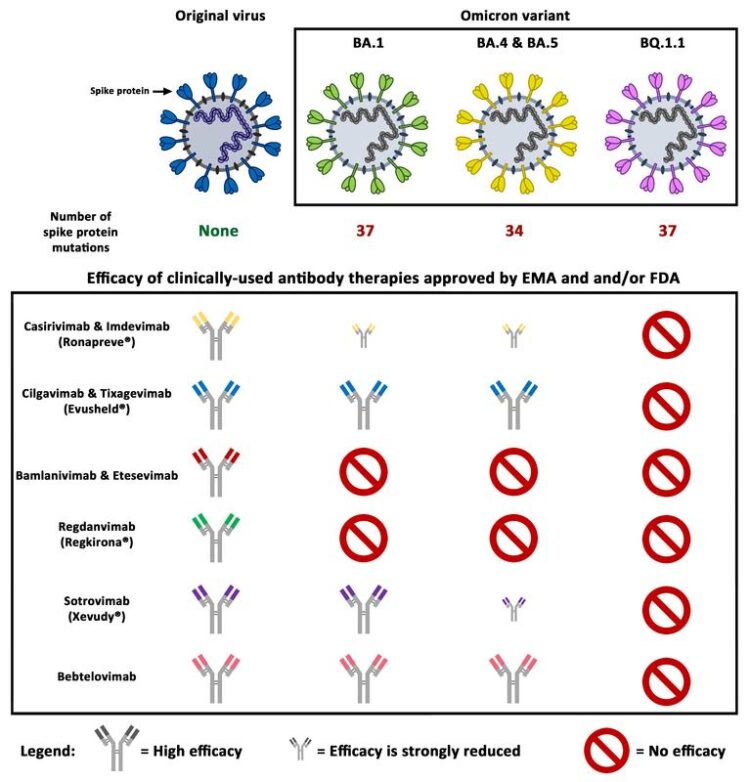New Omicron subvariant BQ.1.1 resistant to all therapeutic antibodies

Omicron sub-lineage BQ.1.1 is the first variant resistant to all antibody therapies currently approved by the EMA (European Medicines Agency) and/or FDA (US Food and Drug Administration).
Bild: Markus Hoffmann / Deutsches Primatenzentrum
Development of new antibody therapies necessary.
Are the currently approved antibody therapies used to treat individuals at increased risk for severe COVID-19 disease also effective against currently circulating viral variants? A recent study by researchers at the German Primate Center (DPZ) – Leibniz Institute for Primate Research and Friedrich-Alexander University Erlangen-Nürnberg shows that the Omicron sub-lineage BQ.1.1, currently on the rise worldwide, is resistant to all approved antibody therapies (The Lancet Infectious Diseases).
As a result of an infection with the SARS coronavirus-2 (SARS-CoV-2) or a COVID-19 vaccination, an immune response is triggered that entails the formation of neutralizing antibodies that help protect against (re)infection with SARS-CoV-2 or a severe course of the disease. Neutralizing antibodies protect by binding to the viral spike protein, which prevents the virus from entering cells. However, due to mutations in the spike protein, some SARS-CoV-2 variants, particularly the Omicron variant, evade neutralizing antibodies and cause symptomatic infections even in vaccinated or convalescent persons. This is referred to as immune evasion and threatens high-risk groups such as the elderly and people with weakened immune systems, for example, due to illness or medication. They often fail to develop an immune response sufficient for protection from severe disease, even after full vaccination. To protect high-risk patients, biotechnologically produced antibodies are administered as a preventive measure or as an early therapy upon confirmed SARS-CoV-2 infection. Mutations in the spike protein of different SARS-CoV-2 variants confer resistance to individual antibody therapies. Therefore, it is important to regularly monitor whether therapeutic antibodies continue to be effective against currently circulating viral variants.
A team of researchers from the Infection Biology Unit at the German Primate Center – Leibniz Institute for Primate Research and the Division of Molecular Immunology at the Friedrich-Alexander-University Erlangen-Nürnberg has investigated how efficiently approved antibody therapies inhibit the currently circulating Omicron subvariants. The researchers found that the Omicron subvariant BQ.1.1, which is on the rise worldwide, is resistant to all available antibody therapies. “For our studies, we mixed non-propagating viral particles carrying the spike protein of selected viral variants with different dilutions of the antibodies to be tested and subsequently measured the amount of antibody needed to inhibit infection of cell cultures. In total, we tested twelve individual antibodies, six of which are approved for clinical use in Europe, and four antibody cocktails” explains Prerna Arora, lead author of the study. The researchers found that the Omicron subvariant BQ.1.1 could not be neutralized by either individual antibodies or antibody cocktails. In contrast, the currently predominant Omicron subvariant BA.5 was still neutralized by one approved antibody and two approved antibody cocktails. “With high-risk patients in mind, we are very concerned about the Omicron subvariant BQ.1.1 being resistant to all approved antibody therapies. Particularly in regions where BQ.1.1 is widespread, physicians should not rely on antibody therapies alone when treating infected high-risk patients, but should also consider administering other drugs such as paxlovid or molnupiravir,” comments study leader Markus Hoffmann on the results of the study.
The finding that the Omicron subvariant BQ.1.1 is already resistant to a new antibody therapy that is about to be approved in the U.S. highlights the importance of developing new antibody therapies against COVID-19. “The ever-increasing development of antibody resistance of SARS-CoV-2 variants calls for the development of new antibody therapies that are specifically targeted to currently circulating and future viral variants. Ideally, they should target regions in the spike protein that have little potential for escape mutations,” concludes Stefan Pöhlmann, head of Infection Biology Unit at the German Primate Center – Leibniz Institute for Primate Research.
Wissenschaftliche Ansprechpartner:
Prof. Dr. Stefan Pöhlmann
Phone: +49 (0) 551 3851 150
Email: spoehlmann@dpz.eu
Dr. Markus Hoffmann
Phone: +49 (0) 551 3851 338
Email: mhoffmann@dpz.eu
Originalpublikation:
Arora P, Kempf A, Nehlmeier I, Schulz SR, Jäck H-M, Pöhlmann S, Hoffmann M (online): Omicron sublineage BQ1.1 resistance to monoclonal antibodies. The Lancet Infectious Diseases. https://doi.org/10.1016/S1473-3099(22)00733-2
Weitere Informationen:
http://medien.dpz.eu/pinaccess/showpin.do?pinCode=ZU8mi0B2NpfV printable pictures
Media Contact
All latest news from the category: Life Sciences and Chemistry
Articles and reports from the Life Sciences and chemistry area deal with applied and basic research into modern biology, chemistry and human medicine.
Valuable information can be found on a range of life sciences fields including bacteriology, biochemistry, bionics, bioinformatics, biophysics, biotechnology, genetics, geobotany, human biology, marine biology, microbiology, molecular biology, cellular biology, zoology, bioinorganic chemistry, microchemistry and environmental chemistry.
Newest articles
Faster, more energy-efficient way to manufacture an industrially important chemical
Zirconium combined with silicon nitride enhances the conversion of propane — present in natural gas — needed to create in-demand plastic, polypropylene. Polypropylene is a common type of plastic found…

Energy planning in Ghana as a role model for the world
Improving the resilience of energy systems in the Global South. What criteria should we use to better plan for resilient energy systems? How do socio-economic, technical and climate change related…

Artificial blood vessels could improve heart bypass outcomes
Artificial blood vessels could improve heart bypass outcomes. 3D-printed blood vessels, which closely mimic the properties of human veins, could transform the treatment of cardiovascular diseases. Strong, flexible, gel-like tubes…




















